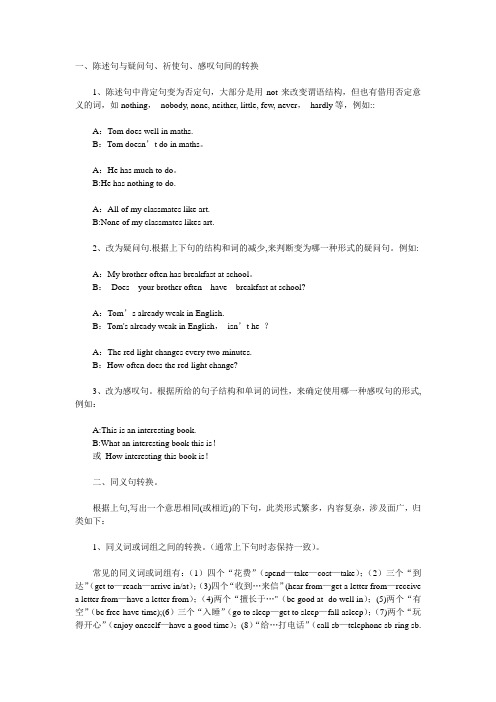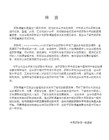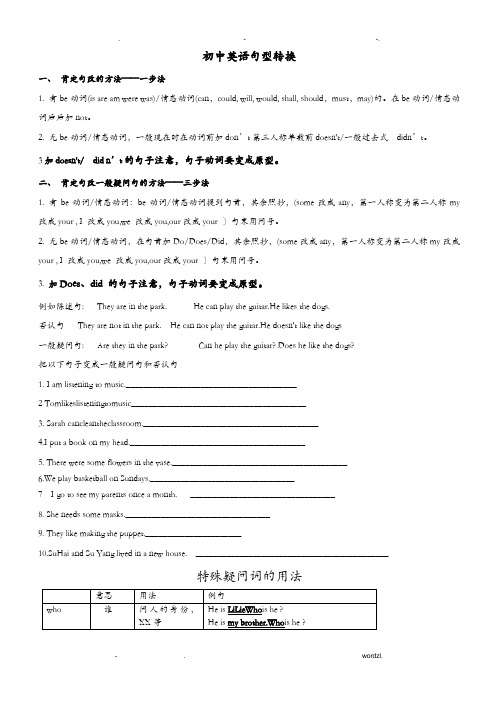初三英语句型转换
初中英语句型转换和同义词转换

一、陈述句与疑问句、祈使句、感叹句间的转换1、陈述句中肯定句变为否定句,大部分是用not来改变谓语结构,但也有借用否定意义的词,如nothing,nobody, none, neither, little, few, never,hardly等,例如::A:Tom does well in maths.B:Tom doesn’t do in maths。
A:He has much to do。
B:He has nothing to do.A:All of my classmates like art.B:None of my classmates likes art.2、改为疑问句.根据上下句的结构和词的减少,来判断变为哪一种形式的疑问句。
例如:A:My brother often has breakfast at school。
B:Does your brother often have breakfast at school?A:Tom’s already weak in English.B:Tom's already weak in English,isn’t he ?A:The red light changes every two minutes.B:How often does the red light change?3、改为感叹句。
根据所给的句子结构和单词的词性,来确定使用哪一种感叹句的形式,例如:A:This is an interesting book.B:What an interesting book this is!或How interesting this book is!二、同义句转换。
根据上句,写出一个意思相同(或相近)的下句,此类形式繁多,内容复杂,涉及面广,归类如下:1、同义词或词组之间的转换。
(通常上下句时态保持一致)。
常见的同义词或词组有:(1)四个“花费”(spend—take—cost—take);(2)三个“到达”(get to—reach—arrive in/at);(3)四个“收到…来信”(hear from—get a letter from—receive a letter from—have a letter from);(4)两个“擅长于…"(be good at -do well in);(5)两个“有空”(be free-have time);(6)三个“入睡”(go to sleep—get to sleep—fall asleep);(7)两个“玩得开心”(enjoy oneself—have a good time);(8)“给…打电话”(call sb—telephone sb-ring sb.a call-make a telephone to sb.)(9)“飞往…”(fly to…—go to…by air/plane)(10)“自学”(teach oneself-learn…by oneself)(11)在…方面帮助help…with…-help…(to)do…(12)在…差be weak in…—do badly in…(13)能/会…can—be able to(14)更喜欢…like…better than…-prefer…to…(15)充满了…be full of…—be filled with…(16)放弃干…give up doing…—stop doing…(17)不再…no longer—not …any longer(18)照顾/保管take care of…—look after(19)展览on show—on display(20)阻止…干…stop…from doing—keep/prevent…from doing…(21)由于thanks to—because of…(22)举手hands up—put up one's hands(23)最后,终于at last-in the end(24)与…不同be different from…—be not the same as…(25)从…借入…borrow…from…—lend…to…(26)乘公汽/火车/的士go to…by bus/train/taxi-take a bus /train/taxi to…(27)乘自行车去…go to…by bike—ride a bike to…(28)为…感到自豪be proud of…—be the pride of…(29)步行去…walk to…-go to…on foot (30)独自地by oneself -alone等.例如:A:The children had a good time in the park.B:The children enjoyed themselves in the park.2、同义句型之间的转化.常见的同义句型有①It seems that 从句→Somebody seems(to be)+adj/n ②It's kind of sb. to do…→Somebody is kind to do…③What does…mean?→What do you mean by…? 或What’s the meaning of…?④There is something wrong with…→Something is wrong with…⑤not…until…与when/after/before引导的时间状语从句的转换⑥What's wrong with…?→What’s the matter with…? ⑦How is…?→What’s…like…?⑧How do you like…?→What do you think of?⑧It's time that…→It’s time for sb. to do…⑨It’s said that…→People say that…⑩Can I help you? →What can I do for you?例如:A:I went to bed after I finished my homework。
九年级英语句型转换专项练习

九年级英语句型转换练习题1、句型转换101。
There was some milk in the bottle. (改为否定句)There __wasn"t__________ any____________ milk in the bottle。
102。
Kevin will take a holiday to France the week after next. (用 two weeks ago 改写句子)Kevin __took__________ a holiday to France two weeks ago.103 The knife in the box is Toney’s。
(改为复数形式)The ____________ in the boxes ____________Toney’s。
104。
Was the machine invented by David? She wasn’t sure. (合并成一句话)She wasn't sure ____________ the machine was invented by David,105。
The children have never done that before。
(改为反义疑问句)The children have never done that before, ____________?2、句型转换。
66. They have been talking for the whole three hours。
(一般疑问句并作肯定回答)__________they____________ ____________ for the whole three hours? Yes,they ______ .67。
How about a goldfish ? .(改为同义句)___ _______ a goldfish ?68。
英语课程初三句型转换练习题及答案

英语课程初三句型转换练习题及答案句型转换是英语学习中的重要环节,通过转换句型可以帮助学生加深对语法规则的理解和应用。
下面是一些初三英语句型转换练习题及其答案,希望对你的学习有所帮助。
1. 改写句子,使含有"used to"的句子变为一般疑问句和否定句。
句子:She used to live in London.一般疑问句:Did she use to live in London?否定句:She didn't use to live in London.2. 将下列句子改为同义句。
句子:I wish I could play the piano.同义句:I hope I can play the piano.3. 改写句子,使含有"too...to"的句子变为否定句和一般疑问句。
句子:He is too young to go to school.否定句:He is not old enough to go to school.一般疑问句:Is he old enough to go to school?4. 将下列句子改为祈使句。
句子:You should finish your homework on time.祈使句:Finish your homework on time.5. 改写句子,使含有"both...and"的句子变为同义句。
句子:He both plays basketball and football.同义句:He plays both basketball and football.6. 将下列句子改为被动语态。
句子:They have built a new hospital in our town.被动语态:A new hospital has been built in our town by them.7. 改写句子,使含有"unless"的句子变为同义句。
初三英语句型转换试题答案及解析

初三英语句型转换试题答案及解析1.根据所给提示,完成句子。
每空一词,含缩略词。
【1】He did his homework last night. (改为否定句)He __________ __________ his homework last night.【答案】didn’t do【解析】原句为:他昨晚做了家庭作业。
改成否定句,在主语后加上助动词did和not,缩写成didn’t;然后谓语动词恢复成原形do。
【2】The kid is playing the piano at the school music club. (对划线部分提问)__________ is the kid __________ the piano?【答案】Where , playing【解析】原句为:孩子在学校音乐俱乐部弹钢琴。
划线部分是地点状语,故用疑问词where,后接一般疑问句;playing不变,表示现在进行。
【3】Visitors love this city because it has historical sights and delicious food. (改为同义句) Visitors love this city __________ _________ its historical sights and delicious food.【答案】because of【解析】原句为:旅游者喜欢这个城市,因为它有历史景点和美味的食物。
Because引导从句,相当于because of引导短语。
【4】他两个月没有收到他儿子的信了。
(完成译句)He hasn’t ________ ________ his son for two months.【答案】heard from【解析】句中用到了现在完成时have/ has+动词过去分词;hear from收到来信,其过去分词形式为heard from。
【考点】句型转换。
必备英语中考句型转换词组及时态

十.现在完成进行时:
1.概念:在过去某一时刻之前开始的动作或状态一直持续到说话为止
2.基本结构:have/has +been+doing
几种常见时态的相互转换
英语中的几种时态在一定情况下可以互相转换,以下是几种常见的转换形式:
十一、 一般过去时与现在完成时的转换
在现在完成时中,延续性动词能与表示一段时间的状语连用,瞬间动词却不能。但是,可用别的表达方式:①瞬间动词用于“一段时间 + ago”的一般过去时的句型中;②瞬间动词可改成与之相对应的延续性动词及短语,与一段时间连用;③瞬间动词用于“It is + 一段时间 + since + 一般过去时”的句型中,表示“自从……以来有……时间”的意思,主句一般用it is来代替It has been;④瞬间动词用于“Some time has passed since + 一般过去时”的句型中。请看:
3.基本结构:was/were+doing
4.否定形式:was/were + not + doing.
5.一般疑问句:把was或were放于句首。
6.例句:At that time she was working in a PLA unit.
When he came in, I was reading a newspape so busy.
三、 现在进行时:
1.概念:表示现阶段或说话时正在进行的动作及行为。
2.时间状语:now, at this time, these days, etc.
3.基本结构:am/is/are+doing
4.否定形式:am/is/are+not+doing.
初中英语句型转换

.--.初中英语句型转换一、 肯定句改的方法——一步法 1. 有 be 动词(is are am were was)/情态动词(can,could, will, would, shall, should,must,may)的。
在 be 动词/情态动 词后后加 not。
2. 无 be 动词/情态动词,一般现在时在动词前加 don’t 第三人称单数前 doesn't/一般过去式 didn’t。
3 加 doesn't/ did n’t 的句子注意,句子动词要变成原型。
二、 肯定句改一般疑问句的方法——三步法 1. 有 be 动词/情态动词:be 动词/情态动词提到句首,其余照抄,(some 改成 any,第一人称变为第二人称 my 改成 your , I 改成 you,we 改成 you,our 改成 your 〕句末用问号。
2. 无 be 动词/情态动词,在句首加 Do/Does/Did,其余照抄,(some 改成 any,第一人称变为第二人称 my 改成 your , I 改成 you,we 改成 you,our 改成 your 〕句末用问号。
3. 加 Does、did 的句子注意,句子动词要变成原型。
例如陈述句: They are in the park.He can play the guitar.He likes the dogs.否认句 They are not in the park. He can not play the guitar.He doesn't like the dogs一般疑问句: Are they in the park?Can he play the guitar? Does he like the dogs?把以下句子变成一般疑问句和否认句1. I am listening to music._______________________________________2 Tomlikeslisteningtomusic________________________________________3. Sarah cancleantheclassroom.________________________________________4.I put a book on my head.________________________________________5. There were some flowers in the vase.________________________________________ 6.We play basketball on Sundays._________________________________ 7 I go to see my parents once a month. _________________________________8. She needs some masks._________________________________9. They like making the puppet.______________________10.SuHai and Su Yang lived in a new house. ____________________________________________特殊疑问词的用法意思用法例句who谁问 人 的 身 份 , He is LiLieWhois he ?XX 等He is my brother.Whois he ?-.wordzl..--.whom谁问 人 的 身 份 , I can ask him the question.XX 等(问宾语〕 Whom can you ask the question?what什么问 人 的 职 业 或 He is a worker.What is he?事物是什么He has a book. What does he have ?which哪一个 问一定 X 围内 The big box is mine. Which box is yours?特指的人或物 The girl at the door is Ann. Which girl isAnn?whose谁的问所属关系This is herbook.Whosebook is this ?This book is hers. Whose is this book?what color 什么颜色 问颜色〔表语〕 My skirt is red. What color is your skirt?What time 几点问点时间We play games at five in the afternoon ?What time do you play games?when什么时候 问时间We play games in the afternoon ?When do you play games?where什么地方 问地点〔状语〕 We play games at home on Sunday ?Where do you play games on Sunday?why为什么 问原因He isn't at school today because he is ill.Why isn't he at school today ?how怎样问安康状况、 He is fine/strong. How is he ?做事的方式等 I go home by bike. How do you go home?how old 多大几岁 问年龄He is ten.How old is he ?how many 多少跟复数名词, There are thirtyboys in my class.问数量How manyboys are there in your class?how much 多少跟不可数名词 There is somemilk in the bottle.问数量或价钱 How muchmilk is there in the bottle?how far 多远问路程It's five kilometers away from here?How far is it from here?how soon 多久问 in+一段时间 He can finish it in half an hour.How soon can he finish it ?how long 多久问一段时间, He has lived here for a year.问物体的长短 How long has he lived here?The desk is one meters long.How long is the desk ?how often 多久问频率I go to see my parents once a month.〔一次〕How often do you go to see your parents?How 的疑问句辨析一、how many 和 howmuch 的区别how many 用来询问可数名词的数量,它的句式是:How many+复数名词+一般疑问句+?how much 用来询问不可数名词的数量,也可询问价格。
初中英语句型转换讲解及练习

句型转换讲解及训练肯定陈述句变否定陈述句步骤:一看情系助二变 第一人称I ,we 变第二人称you my---yoursome-----any something---anything already----yet :并列连词and--or too----either eg: Judy can write stories.________________________________________________ He reads Chinese pomes every morning.________________________________________________ His friend has already mailed the photos._________________________________________________ 陈述句变一般疑问句 ;步骤:一看情系助二变eg :My mother has lunch in the factory._____________________________________________________ {She did very well in her English exam._____________________________________________________ Mary often watches TV at home in the evening._____________________________________________________ There is some milk in the bottle._____________________________________________________*陈述句变选择疑问句的方法:首先将句子变成一般疑问句,然后用or 连接被选择的部分。
英语句型转换的方法与例子

英语句型转换的方法与例子摘要英语句型转换是指按照一定的要求,把一个句子改写成另一个意思相同或相近的句子,不改变原句的主要意思。
英语句型转换的目的是为了使句子更加简洁、准确、自然和地道,也可以增加句子的变化和丰富性,避免重复和单调。
英语句型转换的方法有很多,本文将介绍以下几种常见的方法:同义词或近义词替换主动语态和被动语态互换陈述句和疑问句互换直接引语和间接引语互换并列句和复合句互换定语从句和非限制性定语从句互换分词短语和独立主格结构互换一、同义词或近义词替换定义同义词或近义词替换是指用意思相同或相近的词或短语来替换原句中的某些词或短语,使句子更加简洁、准确或地道。
规则替换的词或短语必须在意思、用法、搭配和语气上与原词或短语相符。
替换后的句子不能改变原句的主要意思。
替换后的句子不能造成歧义或误解。
例子原句替换后的句子He is very angry with me.He is very mad at me.She passed away last night.She died last night.He made a mistake in the test.He went wrong in the test.I can't stand him.I hate him.He gave me a hand with my homework.He helped me with my homework.二、主动语态和被动语态互换定义主动语态和被动语态互换是指把一个主动语态的句子改写成一个被动语态的句子,或者把一个被动语态的句子改写成一个主动语态的句子,使句子更加客观、强调或适应上下文。
规则主动语态变被动语态时,要把原主语变成by短语放在被动语态谓语之后,把原宾语变成新主语放在被动语态谓语之前,把原谓语动词变成被动形式(即be+过去分词),并保持时态、人称和数一致。
被动语态变主动语态时,要把原by短语去掉,把原主语变成新宾语放在主动谓语之后,把原谓语动词变成主动形式,并保持时态、人称和数一致。
- 1、下载文档前请自行甄别文档内容的完整性,平台不提供额外的编辑、内容补充、找答案等附加服务。
- 2、"仅部分预览"的文档,不可在线预览部分如存在完整性等问题,可反馈申请退款(可完整预览的文档不适用该条件!)。
- 3、如文档侵犯您的权益,请联系客服反馈,我们会尽快为您处理(人工客服工作时间:9:00-18:30)。
Exercises:把下列句子改为成宾语从句或简单句
1.The boy asked his mother ,“ Have you finished cooking the dinner? ”
2.He says,“we will have a picnic next week. ”
3.Mum has told me , “Dad will come back in three months.”
4.The teacher asked ,“Who wants to be a volunteer?”
5. He wondered …Does Mary want to go travelling this summer holiday?
6.“The Earth turns around the sun.”The teacher told the students.
7.The boy asked the teacher,“Does water freeze at 0°C ? ”
8.I don’t know when we shall leave for Nanjing.
10.Mrs White told Tom that he mustn’t throw paper on the ground.
11.Mary hoped that she would pass the exam in the test.
12.Which skirt shall I choose? I haven’t decided.
13.I wonder what we will visit next week.
14 “Can you help me carry heavy box upstairs?” Mr. White asks. (改为复合句)
15 This is a book . Its cover is blue .(合并成复合句)
16 The water was so dirty that we couldn’t drink it .(改成简单句)
17 Had he walked along the river for ten days ? He wanted to know .(改为含有宾语从句的复合句)
18 I think . It won’t get warmer tom orrow .(合并成复合句)
19. At the age of four , she began to learn dancing.(改写成复合句)
20."Are you going to watch the football match next Sunday?" Father asked me.(改为复合句)
21.Hurry up, or you’ll miss the early train. (改为以if引导的条件状语从句)
22.Mother said to me, “Don’t go alone at night. ”(改为简单句)
23.The maths problem is too difficult for him to work out. (改为复合句)
24.The box was so heavy that she couldn't carry it.(改为简单句)
25.Is the earth round? The little boy asked.(改为宾语从句)
26.He likes the book.So does she.(改为简单句,使句意不变)
______ he ______ she ______ the book.
27.Let's hurry, or we'll be last.(改为复合句)
______ we ______ hurry, we'll ______ late.
28.Do they want fried chicken? He asked the boys…. (连成一句含宾语从句的复合句)
29. At the age of four , she began to learn dancing.(改写成复合句)
30.How often does Tom write to his parents?I want to know.(合并为含有宾语从句的复合句)
31.“Can you drive me to the office building?”she asked me.(改写为含有宾语从句的复合句)32.What are you interested in?Could you tell me?(合并为含有宾语从句的复合句)
33.She said to me,“I will buy a used car because it is much cheaper.”(改写为含有宾语从句的复合句)
34.The trees are growing well.The teachers planted them two years ago.(合并为含有定语从句的复合句)
35.My uncle gave me a bike and I like it.(改写为含有定语从句的复合句)
36.She became ill because it was too cold.(改为简单句)
She became ill _ _____ __ ____ the cold weather.
37.You may come on Sunday. You may come on Monday. (改为简单句)
You may come on Sunday on Monday .
38.Does he like drawing? Could you tell me? (改为复合句)
39.Could you tell me how I can get to the station ? (改为简单句)
40.I found that it was difficult to do the maths problem.(改为简单句)
41.I borrowed a book from the library . It was newly published . (改为定语从句)
42.Hurry up , or you’ll miss the early train. (改为if条件状语从句)
If you ____ __ __ _____ ___ ___ , you’ll miss the early train.
43.Mother said to me, “Don’t go out alone at night.” (改为简单句)
44.The maths problem is too difficult for him to work out. (改为复合句)
The maths problem is ___ ____ difficult _____ _ he can’t work it out.。
